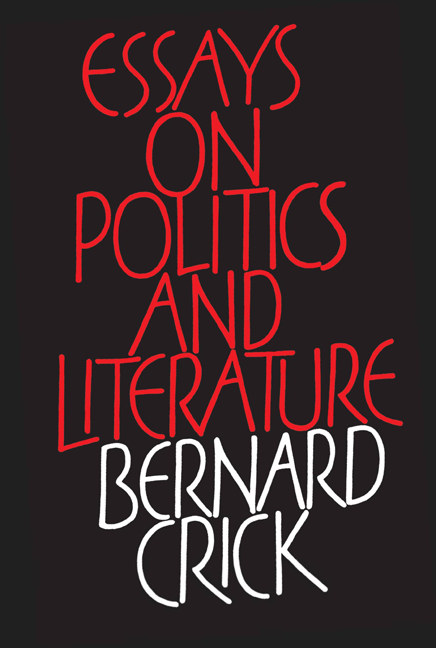Book contents
- Frontmatter
- Contents
- Preface
- Acknowledgements
- Foreword by David Daiches
- One Literature and Politics
- Two The Political in Britain’s Two National Theatres
- Three Young Writers of the Thirties
- Four Koestler’s Koestler
- Five Hannah Arendt: Hedgehog or Fox?
- Six Beatrice Webb as English Diarist
- Seven Words
- Eight My Lse
- Nine Reading The Observer as a Complex Text
- Ten On the Difficulties of Writing Biography and of Orwell’s in Particular
- Eleven Reading Nineteen Eighty-Four As Satire
- Twelve Animal Farm For Schools
- Thirteen Orwell and English Socialism
- Fourteen On the Orwell Trail
- Fifteen Wedekind’s Spring Awakening
- Sixteen Horvath’s Tales From the Vienna Woods
- Seventeen Pinter’s No Man's Land
- Eighteen Polly By Gaslight
- Nineteen Edgar Catches Jenkins’ Ear at the Barbican
- Twenty Barrault at the Barbican
- Index
Seven - Words
Published online by Cambridge University Press: 24 September 2020
- Frontmatter
- Contents
- Preface
- Acknowledgements
- Foreword by David Daiches
- One Literature and Politics
- Two The Political in Britain’s Two National Theatres
- Three Young Writers of the Thirties
- Four Koestler’s Koestler
- Five Hannah Arendt: Hedgehog or Fox?
- Six Beatrice Webb as English Diarist
- Seven Words
- Eight My Lse
- Nine Reading The Observer as a Complex Text
- Ten On the Difficulties of Writing Biography and of Orwell’s in Particular
- Eleven Reading Nineteen Eighty-Four As Satire
- Twelve Animal Farm For Schools
- Thirteen Orwell and English Socialism
- Fourteen On the Orwell Trail
- Fifteen Wedekind’s Spring Awakening
- Sixteen Horvath’s Tales From the Vienna Woods
- Seventeen Pinter’s No Man's Land
- Eighteen Polly By Gaslight
- Nineteen Edgar Catches Jenkins’ Ear at the Barbican
- Twenty Barrault at the Barbican
- Index
Summary
Against Promiscuity
‘Words, words, words’, answered the Lord Hamlet. ‘The ball seemed in the net, Montgomery1 lifted himself off the ground, somehow he got his fingers to it, a miracle, deflected it off the cross-bar; he was there by some supernatural instinct. Words fail me to describe the scene…!!’ No they blooming well didn’t, or if so, then only for the briefest moment. He was just getting his breath back. Then out flowed the words again. Never at a loss for words, but sometimes perhaps homo sapiens, ludens, the Fallen Angel or the Naked Ape is at a loss for the right words.
So I am not so sanguine (which is a lovely word to look up in the full Oxford English Dictionary) as Marghanita Laski said she was about the coinage of new words. Yes, indeed, it is one of the glories of our double-rooted English language that with it we can so readily make new words and extend the meanings of others. But they had better be good ones. Since we haven't got a French or a Hebrew Academy trying to steer the language, rather as governments try to steer the economy, and since even Sir Ernest Gowers in his great book, Plain Words, was just a little bit up-tight, then it is up to all of us who love the language to be a little sceptical, conservative or preservationist about the coiners and developers. I am wide open to be convinced, but I hate promiscuity with words.
Take just two innocent sounding extensions like ‘extremist’ and ‘dialogue’.
How often is the concept ‘religious extremist’ used when what is really meant is ‘fanatic’ or ‘zealot’, both good old words, someone extreme in his claims or action, but not necessarily the extreme point of a common tendency of the religious. He may be a logical reducio ad absurdsam of orthodoxy or he may be plain idiosyncratic. But with the common phrase ‘student extremist’ the tar-brush of extended meaning is often deliberate. In any precise sense ‘studentextremist’ usually refers to either Revolutionary Socialists or to anarchists: but the phrase carries the naughty implication that the extremist exemplifies what is latent in all students—I mean that they are an extrapolation from a rising curve of homogenous student response.
- Type
- Chapter
- Information
- Essays on Politics and Literature , pp. 85 - 92Publisher: Edinburgh University PressPrint publication year: 2020

